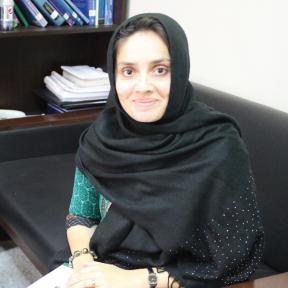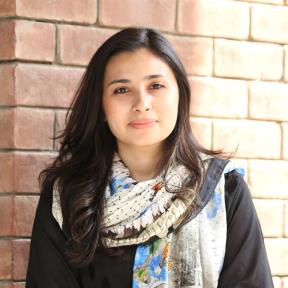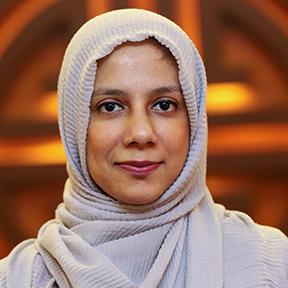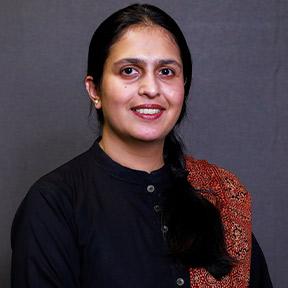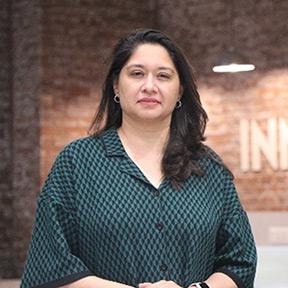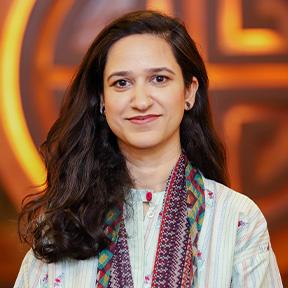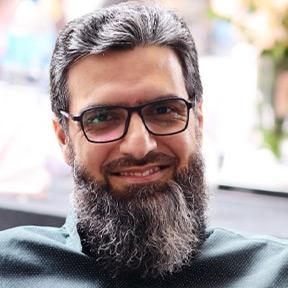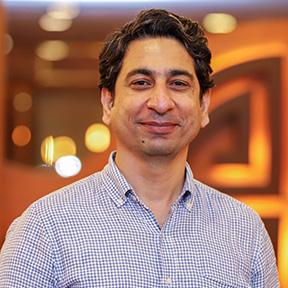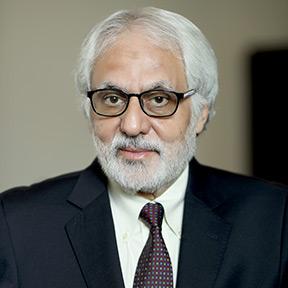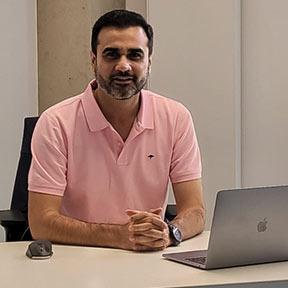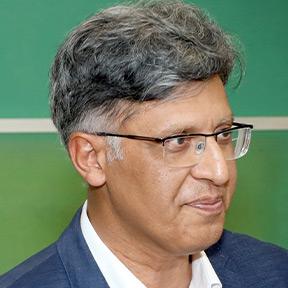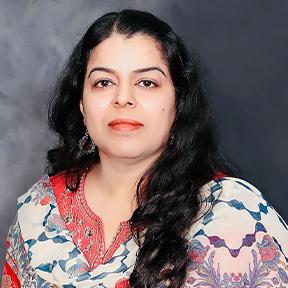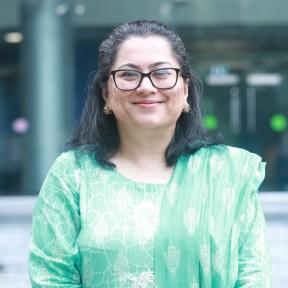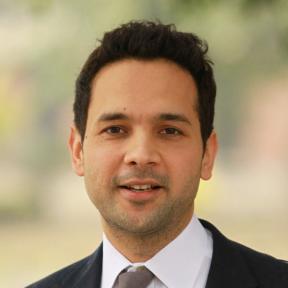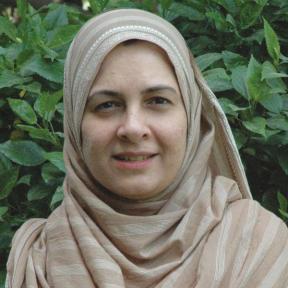The LUMS MBA is a transformative programme for career-driven individuals. It sharpens critical thinking and problem-solving skills through a case-based approach and provides access to diverse perspectives from fellow students, faculty, and guest speakers. With a broad range of courses, the programme ensures a well-rounded education. These features equip you with the tools and network needed to succeed and expand your outlook. I highly recommend it to anyone looking to advance in their career.
Empowering Women in Business & Education
Empowering Women in Business & Education
Sana Chaudhry MBA’22
We spoke to Sana Chaudhry (MBA’ 22), president and founder of the Women in Business (WIB) society at SDSB about the society’s mission, how she wants to inspire aspiring female leaders, and the challenges facing women in the workplace today.
Q. What is Women in Business?
Women in Business is a student society at Suleman Dawood School of Business – LUMS that will empower women in becoming leaders and changemakers. It has been created to give women the tools they need to create value for themselves and their communities. WIB will achieve this mission by creating a network of women leaders that supports women's continued advancement at all levels of decision-making. It will focus on the individual development of members by offering a mentorship program. It will also provide access to more opportunities for students by partnering with inspiring individuals and organisations beyond LUMS, hosting fireside chats with women leaders, and creating a community that encourages lifelong engagement to help students and graduates in the future.
Q. Tell us a bit about your executive council?
I couldn’t have asked for a better team of extremely bright, entrepreneurial and motivated young women. Aniqa Gohar, a UGRAD exchange scholar, is our General Secretary. She worked on the Clinton presidential campaign in the US during her time there. Nayha Arif is our Director Strategy, and is the force behind Lahore Music Meet. Mahnoor Akram, our Director Marketing is a creative genius and has experience handling digital marketing for a top fashion design house. Rimsha Kamran, our Director Operations has handled operations for development projects of the Asian Development Bank. Fizza Ali, our Director HR has consulting experience with Abacus Consulting, and is the brains behind our mentorship program. Sobia Irshad is our Director Social Entrepreneurship, and has worked for several non-profits and has undertaken a wellness program for WIB. Rida Ghaffar is our Director Tech and Entrepreneurship; she is a successful blogger and Instagram influencer - and last but not least, Khadija Ijaz, our Director Funding, is an engineer with a degree from Turkey who brings a fresh perspective to all of our plans and ideas. We also have three male ambassadors on our team; Muhammad Shayan, Ahmed Tariq and Jahanzeb Anwar, who assist in various activities.
Q. Why did you create WIB?
All top business schools in the world have a Women in Business society, and I wanted to meaningfully interact with my peers and to share ideas and collaborate. I spoke to all the female students in our batch (there are 37 of us), and we agreed to become founding members and create this community to support and empower each other. Also, I truly believe that a LUMS MBA means more than just getting a good job - it means creating innovative solutions through business to tackle societal issues like gender equality and poverty. WIB is simply an extension of that.
Q. What are some of the biggest misconceptions that aspiring women leaders are likely to face?
The biggest misconception is that women are not as ambitious as men since they may choose to hold back their careers when they have children. However, this is simply not true! Women want to become CEOs and want to take up challenging assignments. Women, irrespective of marital status or children or even the skillset, do not get a level playing field, and have to work harder than their male counterparts to prove their mettle.
Q. How will WIB play a role in helping women acquire leadership roles?
By providing encouragement, motivation, and support. It's really as simple as that. Women are powerful beings; we only need support for our dreams, opportunities to interact with inspiring individuals and organisations that recognise this power, and tools for individual development. This little effort will go a long way, and we will see more women in leadership roles than ever before!
Q. What would be your society’s main priority to support students? What is most lacking right now, and how would your society address it?
Our main priority is to provide mentorship opportunities to our members; to connect them to successful female leaders who can provide them with advice and mentorship, and inspire them to become leaders themselves one day. What is most lacking is representation of women in leadership positions, the subliminal message then is there are very few of us who become as successful as their male counterparts, and perhaps we’re destined for the same fate as well. When our members get a chance to interact with successful female entrepreneurs, businesswomen, corporate leaders, bankers, social workers and entrepreneurs, we have someone to look up to and learn from.
Q. How have you gotten better at the roller-coaster ride of being a mother, a professional, a student, and an aspiring entrepreneur? Do you feel it is the female inhibitions that they cannot manage both sides; home and work?
I refuse to believe female inhibitions alone are to blame. Our society, our workplaces, and even our loved ones, at times, perpetuate this thinking upon women that you can either pursue a career or raise a family effectively. The whole system needs to be redesigned to support women pursue equal opportunities in the workplace. An African proverb says, "It takes a village to raise a child," and I cannot find a greater truth than this. I had the complete support of my family, my mother, my mother-in-law, and my husband, who all played their part in raising our children. Only then was I able to achieve my goals and dreams. To answer your original question, if I've gotten better at it, I would say that it still remains a roller-coaster, but that's life, and you just have to enjoy the ride!
Q. Please share your observations and experiences with us as an advocate for diversity in the business sector and women's contributions during the pandemic. The impacts of crises are never gender-neutral, and COVID-19 is no exception. What are your thoughts on that?
Under the challenging circumstances of the COVID-19 pandemic, many women, including myself, struggled to do their jobs. Burnout was a real issue. With schools shut down and all work moved online, the challenge was to continue with business as usual while caring for children and the elderly at home during the pandemic. Some companies don't recognise these challenges. This is precisely why gender diversity is crucial in the workplace. The pandemic presents an opportunity for the business sector to recognise how women can balance multiple responsibilities, and are dedicated to achieving the company's goals if their basic needs are met.
Q. We have seen headlines that women leaders across the globe have made positive strides in terms of the control of the spread of the pandemic. How important is women's leadership in governance during a crisis? Does WIB plan to incorporate training for women to equip them better to deal with crises?
That's a prudent observation, and much research has been conducted on the effectiveness of female leadership during crises. A very good example is of German Chancellor Angela Merkel, who is often termed as a leader born out of crises. She led Europe out of the financial crisis, and then the refugee crisis displayed her qualities such as persistence, level-headedness, and expert negotiation. At WIB LUMS, we aim to learn from successful leadership styles worldwide, provide training to our members in conflict resolution, effective negotiation, and handling high-pressure situations by running simulations.
























